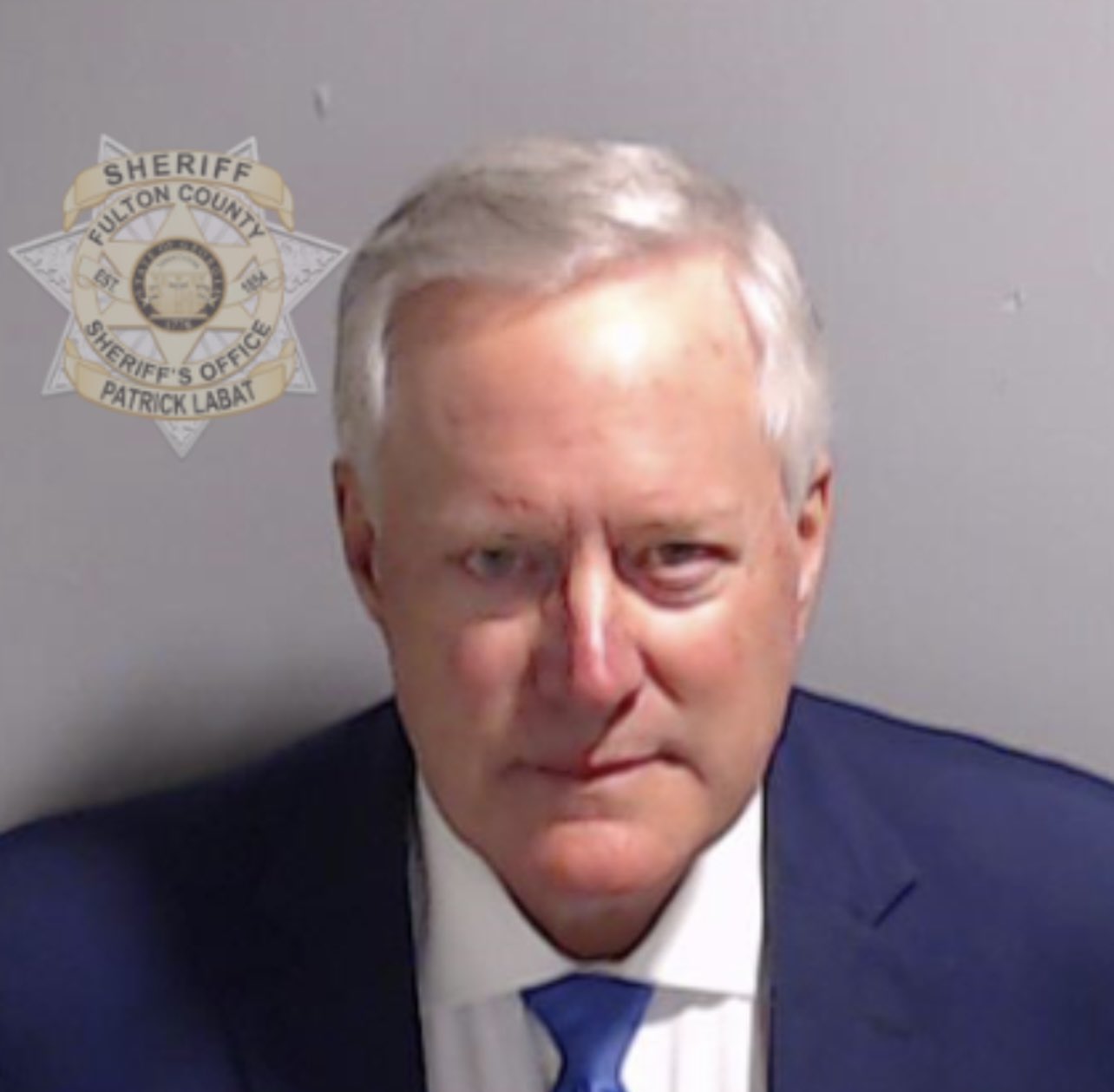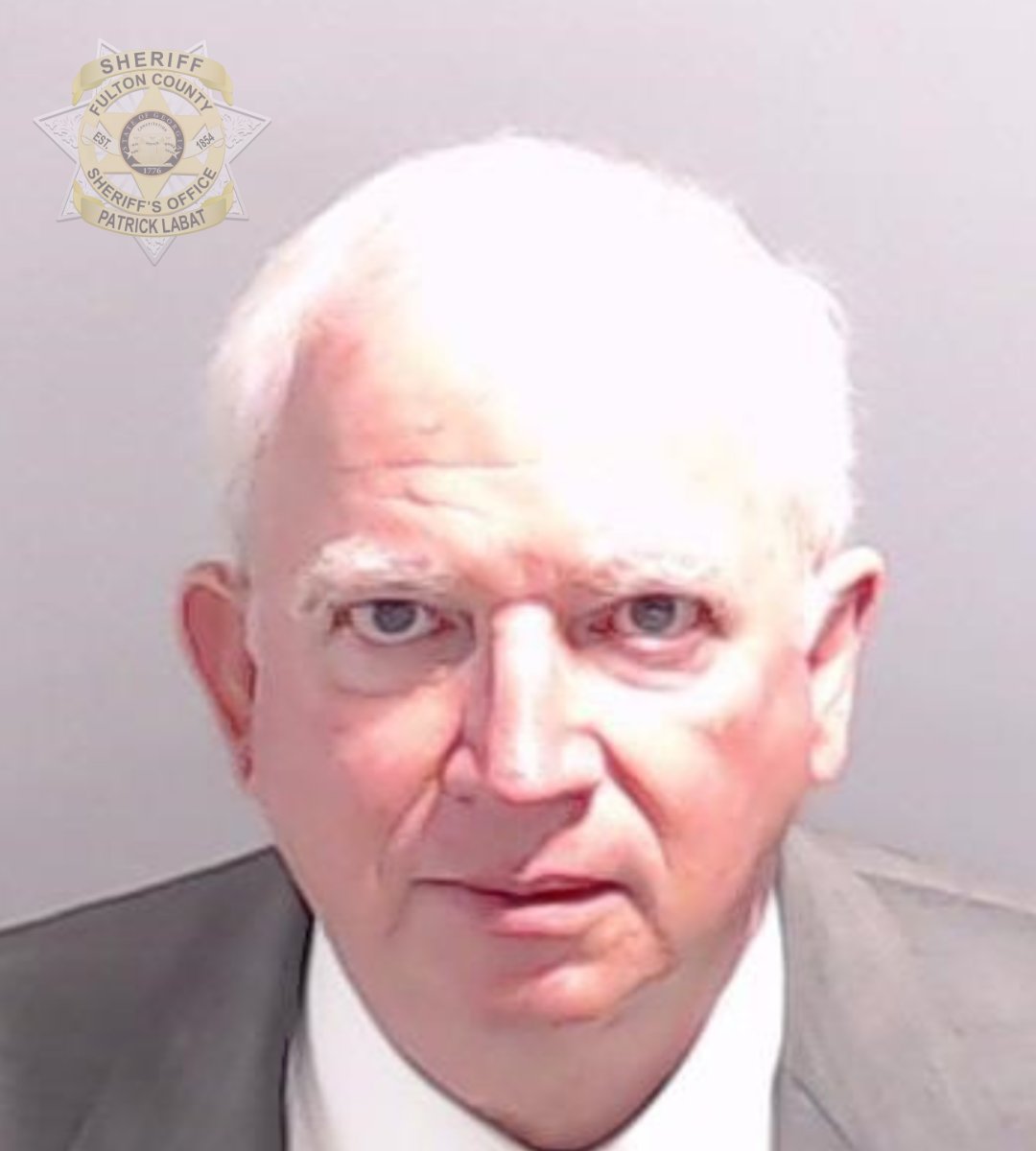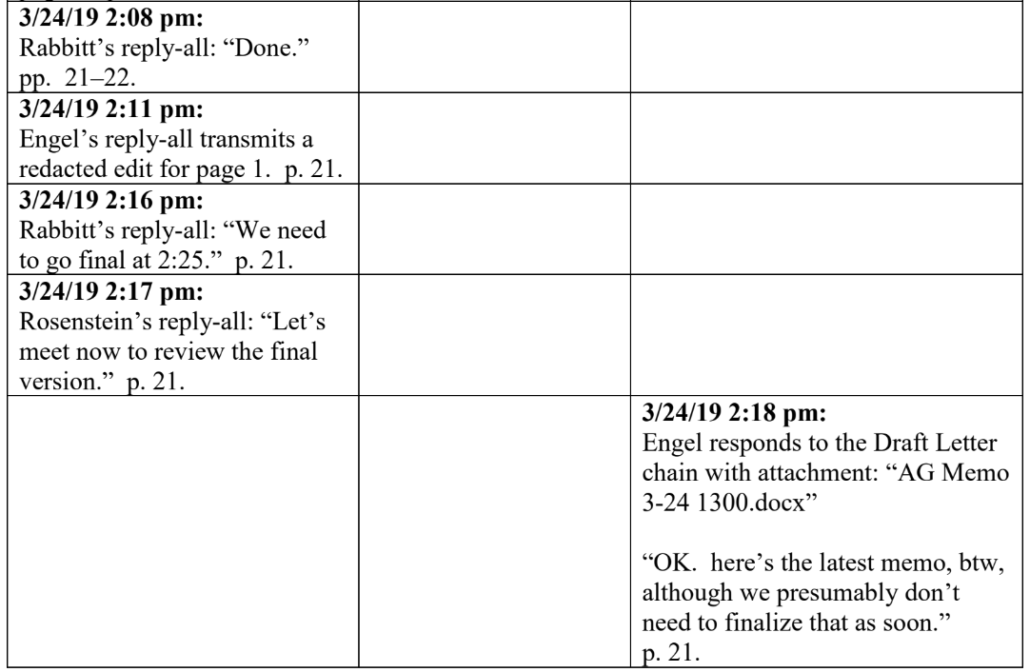In Sri Srinivasan’s opinion in Blassingame holding that presidents, when speaking as candidates, are not immune from civil suit, he pointed to a key moment in the 2020 transition period to illustrate the distinction he was making between when a president running for re-election speaks as an office-seeker, rather than an office-holder: When Trump intervened in the Texas v. Pennsylvania lawsuit.
As an example, consider a situation directly germane to the cases before us in which President Trump publicly volunteered that he was acting—and speaking—in an unofficial, private capacity. In the period after the 2020 election and before January 6, the Supreme Court considered an effort by Texas to challenge the administration of the election in several battleground states in which then-President-elect Biden had been declared the winner. Texas v. Pennsylvania, No. 22O155 (U.S. 2020). President Trump moved to intervene in the case. In doing so, he specifically explained to the Supreme Court (and captioned his filing accordingly) that he sought to “intervene in this matter in his personal capacity as a candidate for re-election to the office of President of the United States.” Motion of Donald J. Trump, President of the United States, to Intervene in his Personal Capacity as Candidate for ReElection, Proposed Bill of Complaint in Intervention, and Brief in Support of Motion to Intervene 14, Texas v. Pennsylvania, No. 22O155 (U.S. Dec. 9, 2020) (Trump Mot. to Intervene). He relatedly elaborated that he wished “to intervene to protect his unique and substantial personal interests as a candidate for re-election to the Office of President.” Id. at 24.
President Trump, then, affirmatively communicated to the Supreme Court (and the public) that he was acting and speaking in that matter in his “personal capacity” as a candidate for reelection—indeed, he explained that his reason for wanting to participate in the case was a “substantial personal” one rather than an official one. That stands in sharp contrast with other cases in which he—like all Presidents—had filed briefs in the Supreme Court in his “official capacity as President of the United States.” See, e.g., Brief for the Petitioners at II, Trump v. Hawaii, 138 S. Ct. 2392 (No. 17-965). But while President Trump’s effort to participate in Texas v. Pennsylvania was made in an expressly and self-consciously personal, unofficial capacity, the content of his speech in his submission undoubtedly involved a matter of significant public concern: his challenge to the election results in various pivotal states, whose “electors [would] determine the outcome of the election.” Trump Mot. to Intervene 27.
As that example illustrates, an immunity for all presidential speech on matters of public concern—without regard to the context in which the President speaks—would be grounded purely in “the identity of the actor who performed it” rather than “the nature of the function performed.” Clinton, 520 U.S. at 695 (quoting Forrester, 484 U.S. at 229). Such a result is “unsupported by precedent.” Id. And it is unsupported by the basic object of granting a President official-act immunity: assuring that the President is not “unduly cautious in the discharge of his official duties.” Id. at 694 (emphasis added) (quoting Nixon, 457 U.S. at 752 n.32). That concern necessarily has no salience when the President acts—by his own admission—in an unofficial, private capacity.
b.
As President Trump’s intervention motion in Texas v. Pennsylvania highlights, whether the President speaks (or engages in conduct) on a matter of public concern bears no necessary correlation with whether he speaks (or engages in conduct) in his official or personal capacity. And because it is the latter question that governs the availability of presidential immunity—as a matter both of precedent and of the essential nature of an immunity for (and only for) official acts—we must reject President Trump’s proposed public-concern test as illsuited to the inquiry. [my emphasis; links added]
Remember that time, weeks before the actions alleged in these lawsuits, Srinivasan might have been nudging the six Republican appointees to the Supreme Court, where even Donald Trump admitted that sometimes when the president speaks, he speaks only in his personal capacity?
It was more than that, though, and in ways that might be significant to both the civil cases and Jack Smith’s case.
This was not just Donald Trump acknowledging that, at that moment in December 2020 when he asked the Supreme Court to make him the winner of the 2020 election, he was speaking in his personal capacity. It was John Eastman, Counsel of Record on that motion, who described Trump as such. Eastman filed that motion to intervene, representing Trump in his personal capacity, in a period when he was discussing with Clarence Thomas’ spouse about lawsuits to challenge the results of the election (though she told the January 6 Committee she had no involvement “at all” in Texas v. Pennsylvania). Even Republican members of Congress got into the act, starting with now-Speaker Mike Johnson and including Jim Jordan and Scott Perry.
When Ken Paxton asked the Supreme Court to throw out the votes of four swing states, a bunch of people who would go on to play key roles in the attack on Congress were party to an action in which Co-Conspirator 2 described that Defendant Trump spoke in his personal capacity.
In days ahead, we’ll learn more about how the DC Circuit civil decision being sent back to Amit Mehta will intersect with Tanya Chutkan’s criminal decision that former president Donald Trump is entitled to no immunity as former president. These two decisions may literally and figuratively pass each other in the halls of Prettyman Courthouse, as one decision heads back to the older District chambers and another heads up to the fancier Circuit chambers.
Srinivasan’s opinion is limited, inviting very specific fact-finding.
As I described, in a passage citing the Blassingame decision released just hours earlier, Chutkan very pointedly stopped short of that specificity. She declined to weigh in on whether a former president’s immunity from criminal prosecution would be different if he was acting “within the outer perimeter of the President’s official” duties than if he was engaged in official acts, effectively inviting Srinivasan and his colleagues to do that.
Similarly, the court expresses no opinion on the additional constitutional questions attendant to Defendant’s assertion that former Presidents retain absolute criminal immunity for acts “within the outer perimeter of the President’s official” responsibility. Immunity Motion at 21 (formatting modified). Even if the court were to accept that assertion, it could not grant Defendant immunity here without resolving several separate and disputed constitutional questions of first impression, including: whether the President’s duty to “take Care that the Laws be faithfully executed” includes within its “outer perimeter” at least five different forms of indicted conduct;5 whether inquiring into the President’s purpose for undertaking each form of that allegedly criminal conduct is constitutionally permissible in an immunity analysis, and whether any Presidential conduct “intertwined” with otherwise constitutionally immune actions also receives criminal immunity. See id. at 21–45. Because it concludes that former Presidents do not possess absolute federal criminal immunity for any acts committed while in office, however, the court need not reach those additional constitutional issues, and it expresses no opinion on them.
5 As another court in this district observed in a decision regarding Defendant’s civil immunity, “[t]his is not an easy issue. It is one that implicates fundamental norms of separation of powers and calls on the court to assess the limits of a President’s functions. And, historical examples to serve as guideposts are few.” Thompson v. Trump, 590 F. Supp. 3d 46, 74 (D.D.C. 2022); see id. at 81–84 (performing that constitutional analysis). The D.C. Circuit recently affirmed that district court’s decision with an extensive analysis of just one form of conduct—“speech on matters of public concern.” Blassingame v. Trump, Nos. 22-5069, 22-7030, 22-7031, slip op. at 23–42 (D.C. Cir. Dec. 1, 2023).
Chutkan’s decision might well be sufficient. There are plenty of things a president might do, claiming to do so in his official capacity, which would also break the law; DOJ raised five pretty familiar looking examples in their response to Trump’s bid for absolute immunity.
DOJ points to the possibility that a President might trade a pardon — a thing of value — as part of a quid pro quo to obtain false testimony or prevent true testimony.
[snip]
- A President ordering the National Guard to murder his critics
- A President ordering an FBI agent to plant evidence on his political enemy
- A bribe paid in exchange for a family member getting a lucrative contract
- A President selling nuclear secrets to America’s adversaries
It would be nice if first DC Circuit and then SCOTUS could put this matter to bed, so it stops holding up Trump cases.
But judges like to move cautiously, testing the easy cases before they test the harder ones. With the Srinivasan decision in hand, the DC Circuit might treat the criminal appeal differently than they otherwise might.
For example, they might note, as DOJ did in its response, that five of six Trump described co-conspirators are also private citizens: Trump’s personal attorney Rudy Giuliani, Eastman representing Trump in his personal role, Sidney Powell, whom Trump recent said would be conflicted from representing him personally), Ken Chesebro who also claimed to be representing Trump personally, and Boris Epshteyn, who nominally remained an employee of the campaign.
If invited to do further briefing in light of Srinivasan’s opinion, DOJ might note that after SCOTUS denied Texas v. Pennsylvania cert, Trump’s campaign lawyers gave up the fight, as the January 6 Committee Report describes, ceding the fight to Rudy and the other co-conspirators.
Not everyone on the campaign was eager to pursue the fake elector plan. OnDecember 11th, the U.S. Supreme Court rejected a high-profile lawsuit filedby the State of Texas challenging the election results in Pennsylvania, Georgia, Michigan, and Wisconsin.42 After that decision, the Trump Campaign’s senior legal staffers said that they reduced their involvement in thefake elector effort, apparently because there was no longer a feasible scenario in which a court would determine that President Trump actually won any of the States he contested.43 Justin Clark, who oversaw the Trump Campaign’s general counsel’s office, said that he basically conveyed, “I’mout,” and encouraged his colleagues on the legal team to do the same.44 Findlay told the Select Committee that “we backed out of this thing,” and Morgan, his boss, said he had Findlay pass off responsibility for the electorsas “my way of taking that responsibility to zero.”45
Clark told the Select Committee that “it never sat right with me that there was no . . . contingency whereby these votes would count.”46 “I hadreal problems with the process,” Clark said, because “it morphed into something I didn’t agree with.”47 In his view, the fake electors were “not necessarily duly nominated electors” despite being presented as such.48 Hesaid he believed he warned his colleagues that “unless we have litigationpending like in these States, like I don’t think this is appropriate or, you know, this isn’t the right thing to do.”49
DOJ might also note that, as charged in the indictment, the suit played a specific role in the Georgia allegations, when Chris Carr refused Trump’s request that he join in Texas’ lawsuit, because none of Trump’s claims had merit.
And it’s not just Trump’s personal lawyer co-conspirators. The invocation of Texas v. Pennsylvania even weighs heavily on the role Jeffrey Clark, then serving as Acting Assistant Attorney General at DOJ and so in a far better position to claim to be acting in an official role, played in the alleged conspiracy.
That’s because Trump’s bid to replace Jeffrey Rosen with Clark was directly tied to an effort to get DOJ to file a similar lawsuit. Here’s how Jeffrey Rosen described it to the January 6 Committee.
Q Okay. And want to talk to you also about the December 27th call where | believe you conferenced in Mr. Donoghue. ~ And that involved the President as well. In Mr. Donoghue’s notes, he references John Eastman and Mark Martin and has a note that says: P trusts him.
What do you remember about that aspect of the conversation?
A So I think that day someone had sent over to us a draft Supreme Court brief modeled on the Texas v. Pennsylvania case that the Supreme Court had rejected. And I was I think Rich Donoghue and Steve Engel and I had a meeting that we were there for t0 address an oversight set of issues that had produced some controversy that Members of Congress who – I won’t get nto all that, other than that Mr. Meadows had asserted to me that the thing had – that he and AG Barr had resolved it. But now AG Barr was gone, and it wasn’t resolved, and he wanted to talk to me about getting it resolved.
But at that discussion Mr. Meadows raised with us: ~ Did you guys see the Supreme Courtbrief that was sent over?
And I think we said: Haven’t read it carefully, but it doesn’t look viable.
And he responded in some sense — and, again, I’m paraphrasing, because I don’t I’m repeating the substance rather than the words was: Well, Mark Martin and John Eastman, who are, you know, these great legal scholars, think it’s great idea.
And we said: Well, you know, we’ll get back to you. But preliminary take is it has problems, that it doesn’t look like a good idea to us. But we’ve only had it 2 hours or something like that, you know, whatever the timeframe was, which it was relatively brief.
Trump followed up twice, pushing DOJ to sue as the government.
What I remember better was that, on Wednesday, after the Kurt Olsen incident, I spoke to the President. I think that was just me, or Rich may have been in my office, but I don’t think it was on the speakerphone. Some of these were on speakerphone with me and Rich, and some, it was just me, but Rich could’ve been in my office.
And the way I remember it is, on Wednesday, I wound up telling the President, “This doesn’t work. ~ There’s multiple problems with it. And the Department of Justice is not going to be able todo it” And–
In the same exchange, there was discussion of whether a DOJ attorney, like Jeffrey Clark, could represent the president in his personal capacity.
Q Okay. So is it fair then to say that this was not partof the Department’s official businessatthe time?
A Yes
Q And, to your knowledge, can Jeff Clark as the assistant — Acting Assistant Attorney General for the Civil Division, can he represent the President in a personal capacity while also maintaining his role at the Department of Justice?
A Let me just make sure I understand the question. You’re saying, can he outside of his DOJ role represent the President in a personal capacity? And I’m trying what I’m trying to distinguish is sometimes the President or others get sued in their individual capacity. But they have some form of governmental immunity or the like. And so the government can represent them as individuals. That’s not what you’re getting at. You’re talking about, can a – can someone who’s a government employee, You know, have like a side gig representing a private person?
But then, after Jeffrey Rosen refused to make DOJ Trump’s own personal law firm, Trump took steps to make Jeffrey Clark, who was willing to do that, Acting Attorney General.
This application may even have critical import to the application of 18 USC 1512(c)(2) and (k) to Trump’s actions. Weeks before Trump and Eastman allegedly conspired to obstruct the vote certification on January 6, Eastman described that Trump had “unique and substantial personal interests” in throwing out the votes of four states that voted for Joe Biden. That’s the kind of admission from co-conspirator 2 that would make any analysis of Trump’s corrupt purpose in obstructing the vote certification quite easy.
Srinivasan’s use of Trump’s motion to intervene was, at one level, a very convenient use of Trump’s own legal claims — made before a conservative Supreme Court that will eventually answer both of these questions — against him.
But it maps onto the criminal case, too, in ways that DC Circuit might choose to apply as a way to tiptoe their way into sanctioning the first prosecution of an ex-president for actions he took as an office-seeker, rather than an office-holder.
Update: Ben Wittes and Quinta Jurecic similarly discuss how these two rulings work in tandem.











